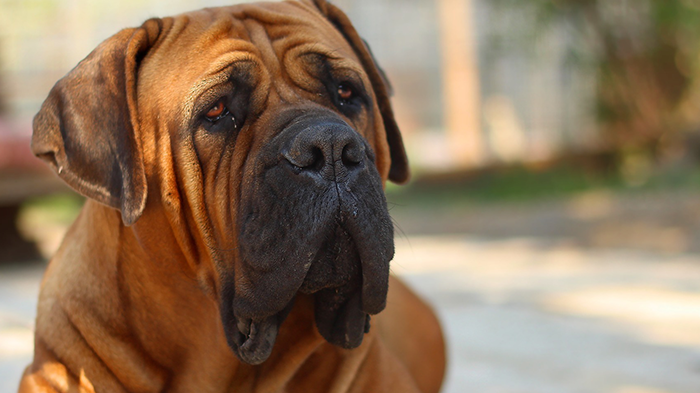Nasal Discharge in Dogs: What Is The Goop Running out of My Dog’s Nose?
Generally put, a dog should not be leaking anything from anywhere. Tell that to the parents of the droolers, right? Drooling, within what is normal for your dog, is an exception.

A dog’s nose is usually moist–for a reason.
Dog noses secrete a thin layer of mucus from membranes within the nose which helps to absorb scent chemicals.
On top of that, besides their footpads, dogs also secrete sweat from the surface of their noses. And the base of the nose is the drainage for superfluous tears.
There are plenty of natural reasons for a wet nose.
What about a runny nose, though?
Like any other cavities exposed to the outer world, the nasal passages are lined with mucosa. I explained what mucus does in the article on mucus in the stool. The purpose of the mucus is to trap foreign particles and infectious agents; it makes me think of the Cinderella story where the prince had put glue on the steps so she couldn’t escape.
A runny nose then is generally a result of increased production of mucus.
Unless it is chronic or comes with other symptoms to hint you might be having a problem on your hands, a small amount of clear discharge is usually not too worrisome.
A dog’s nose will temporarily get runny for many of the same reasons ours do–exposure to dust, high winds, strong fragrances–anything irritating to delicate nasal tissues. If my dog’s nose kept constantly running, though, I would not dismiss that.
Cloudy, smelly, yellow or green discharge is a different story.
I have seasonal allergies, and my nose can run like a faucet. In dogs, though, allergies usually present themselves through skin problems. I would be very slow to dismiss my dog’s nasal discharge due to allergies. It does happen, but it’s not as common as you’d think. Infection is a much more likely culprit, mainly if the discharge is anything but clear and odorless.
Nasal infections can be caused by bacteria, fungi, and/or viruses. For example, viral disease distemper can cause sticky, yellow nasal discharge.
Dental disease and a runny nose?
You won’t find it so weird once you think about it. Infections can spread. Just because it starts at the gums doesn’t mean it will stay there. These bacteria can spread into the nasal cavities and even systemically, such as to the heart.
Other potential causes of nasal discharge include mites, foreign objects, polyps, pneumonia, immune-mediated disorders, trauma, and tumors. Problems outside the respiratory system that can lead to a runny nose include swallowing disorders, facial nerve damage, or a digestive tract disease.
When you see pus, make a fuss.
If your dog’s nasal discharge is cloudy, yellow, green, smelly, or with blood in it. Do see a vet. Particularly with nose bleeds, I would be highly concerned about nasal cancer or a severe infection.
If the discharge is clear and doesn’t smell, I would see a vet if it was excessive or chronic.

Thankfully, my Huskies never had this issue. I do know of folks whose dogs have had it. This is very helpful. I’ll be Pinning to share.
I don’t think any of my dogs have ever had a runny nose. If any of them have a runny nose in the future, I’ll take them to the vet.
This was eye opening. I don’t own a dog however I would have thought the only reason for mucus discharge would be due to infection however you made some very good points. I would have never considered factors like tumors, foreign objects or mites. Thanks for sharing this helpful information.
Thank goodness have not had this problem with Layla but it is always good to know just in case, thanks for this post
I like that you point out that sometimes a runny nose is just that, and it’s just like humans, before you go on to tell us what and how this happens.
It is the kind of thing an owner with things on their mind might not catch without prompting. Your post may save some dogs a lot of discomfort. Thank you.
Very interesting! I hadn’t really thought about how dogs show their allergies through their skin. It would be kind of bothersome to see a dog with “icky” boogers then. I think that the same thing is true of kitties. I had a kitty that lost all of the fur on his tummy when he was allergic to a rug we’d brought in. Now I’m going to be watching my kitties’ noses!
This was VERY interesting! I didn’t realize that allergies wouldn’t necessarily cause a dog’s nose to run. I also didn’t think about the tear duct and nose being connected. But that makes complete sense. My dog, Henry’s left tear duct was completely crushed . He doesn’t have a functioning one in the left eye due to a severe dog attack. He gets immense goo in that eye, which I still clean out numerous times a day. And the attack happed four years ago. That eye prone to infection. I have noticed that his nose will dry out, which I thought was allergy related. But it could be due to that eye. However, it does start running again within a day or so. Actually, I think it’s about as long as it takes to get the eye better. WOW!!! I’m going to pay even closer attention now. He goes to the vet on Tuesday. I’m talking to the vet about this as well. Super information, Jana! I always learn so much from your articles.